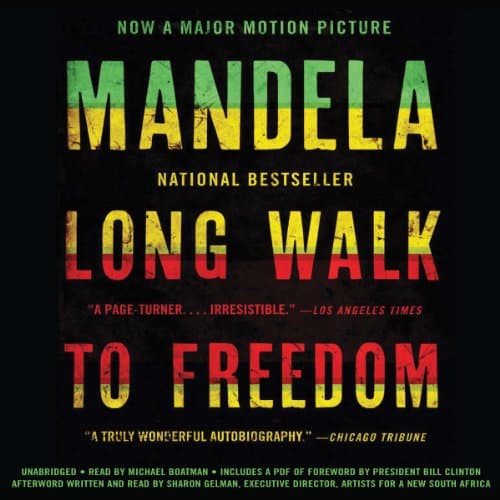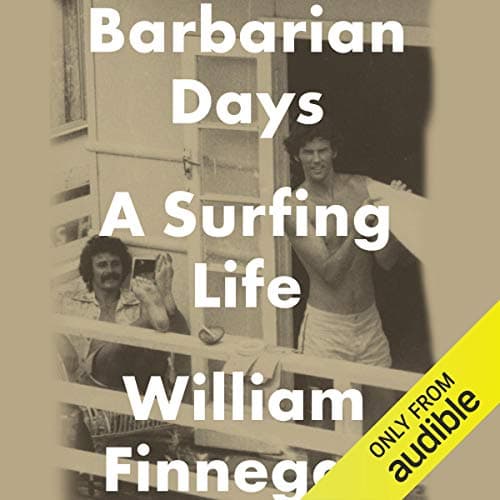Long Walk to Freedom by Nelson Mandela vs. Barbarian Days by William Finnegan
Long Walk to Freedom by Nelson Mandela
Long Walk to Freedom is an autobiography by South Africa's first democratically elected President Nelson Mandela, and it was first published in 1994 by Little Brown & Co. The book profiles his early life, coming of age, education and 27 years spent in prison If you're new to South African history, as I was, this is a great starting point. Why not hear from the man who played a key part in it?
Barbarian Days by William Finnegan
Barbarian Days: A Surfing Life is William Finnegan’s story about growing up obsessed with surfing. It’s not just about catching waves—it’s about a whole way of life that’s demanding, addictive, and sometimes dangerous. Finnegan started young, learning to surf in California and Hawaii, and kept chasing waves into adulthood, traveling through places like Fiji, Australia, Indonesia, and Africa. Along the way, he mixes adventure with self-reflection, talking about friendships formed in the water, the culture around surfing, and how it all fit with the times—especially during the social changes of the 1960s and '70s. The book isn’t just about the thrill of surfing; Finnegan dives into the technical side of waves and the patience it takes to master them. He’s honest about his youthful recklessness—like taking LSD before surfing a massive wave in Maui—and the risks that came with his travels, from malaria scares to navigating shady markets. Still, surfing pulls him along, even when he’s jugg...


Reviews
Reviews
Reviewed on 2/25/2025
| Item | Votes | Upvote |
|---|---|---|
| No pros yet, would you like to add one? | ||
| Item | Votes | Upvote |
|---|---|---|
| No cons yet, would you like to add one? | ||
| Item | Votes | Upvote |
|---|---|---|
| No pros yet, would you like to add one? | ||
| Item | Votes | Upvote |
|---|---|---|
| No cons yet, would you like to add one? | ||
Frequently Asked Questions
'Long Walk to Freedom' by Nelson Mandela and 'Barbarian Days' by William Finnegan are both autobiographies, but they focus on very different subjects. 'Long Walk to Freedom' details the life of Nelson Mandela, his role in the fight against apartheid, and his 27 years in prison. It is a significant work for understanding South African history and Mandela's impact on the world. 'Barbarian Days' is a Pulitzer Prize-winning autobiography that delves into the author's life through the lens of surfing. It offers a more personal and introspective look at Finnegan's experiences. Whether one is better than the other depends on your interest: historical and political insights from Mandela's life or the personal journey and adventure of Finnegan's surfing life.
'Long Walk to Freedom' by Nelson Mandela offers a more historical perspective compared to 'Barbarian Days' by William Finnegan. Mandela's autobiography is deeply rooted in the historical context of South Africa's struggle against apartheid and provides an in-depth look at significant political events and social changes. On the other hand, 'Barbarian Days' focuses more on the personal and adventurous life of the author, particularly his experiences with surfing, and does not delve into historical events in the same way.
'Long Walk to Freedom' is an autobiography by South Africa's first democratically elected President, Nelson Mandela. First published in 1994 by Little Brown & Co, the book chronicles Mandela's early life, his coming of age, education, and the 27 years he spent in prison. It provides a comprehensive look at his journey and role in South African history.
Nelson Mandela was the first democratically elected President of South Africa and a key figure in the fight against apartheid. He spent 27 years in prison for his activism and became a global symbol of resistance to oppression. Mandela's leadership and vision were instrumental in transitioning South Africa towards a more inclusive and democratic society.
'Long Walk to Freedom' is a deeply personal and insightful account of Nelson Mandela's life and the struggle against apartheid in South Africa. If you're new to South African history, this book serves as a great starting point, offering firsthand insight from one of its most pivotal figures.
'Long Walk to Freedom' is significant because it provides an intimate look at the life of Nelson Mandela, one of the 20th century's most influential figures. The book details not only his personal struggles and triumphs but also offers a broader perspective on the fight against apartheid and the eventual establishment of a democratic South Africa.
'Barbarian Days: A Surfing Life' is a memoir by William Finnegan that chronicles his lifelong obsession with surfing. The book explores not only the thrill of catching waves but also the culture surrounding surfing, the friendships formed in the water, and the personal reflections that come with a life dedicated to this demanding and sometimes dangerous sport. Finnegan shares his experiences from California and Hawaii to Fiji, Australia, Indonesia, and Africa, blending adventure with introspection.
'Barbarian Days' delves into several themes, including the passion and addiction associated with surfing, the risks involved in pursuing this lifestyle, and the impact of social changes during the 1960s and '70s. Finnegan reflects on his youthful recklessness, the technical aspects of surfing, and the balance between his career as a war reporter and his love for the ocean.
William Finnegan's writing in 'Barbarian Days' is characterized by vivid descriptions and a reflective tone. He captures both the beauty and the challenges of surfing, making readers feel as if they are experiencing the adventures alongside him. His narrative combines storytelling with insightful observations about life, friendship, and the allure of the ocean.
While there are no specific pros and cons listed for 'Barbarian Days', readers often appreciate its engaging storytelling and deep exploration of surfing culture. Some may find the technical aspects of surfing and the author's personal reflections to be less appealing if they are not interested in the sport. Overall, it is celebrated for its literary quality and the way it captures the essence of a life spent chasing waves.



















